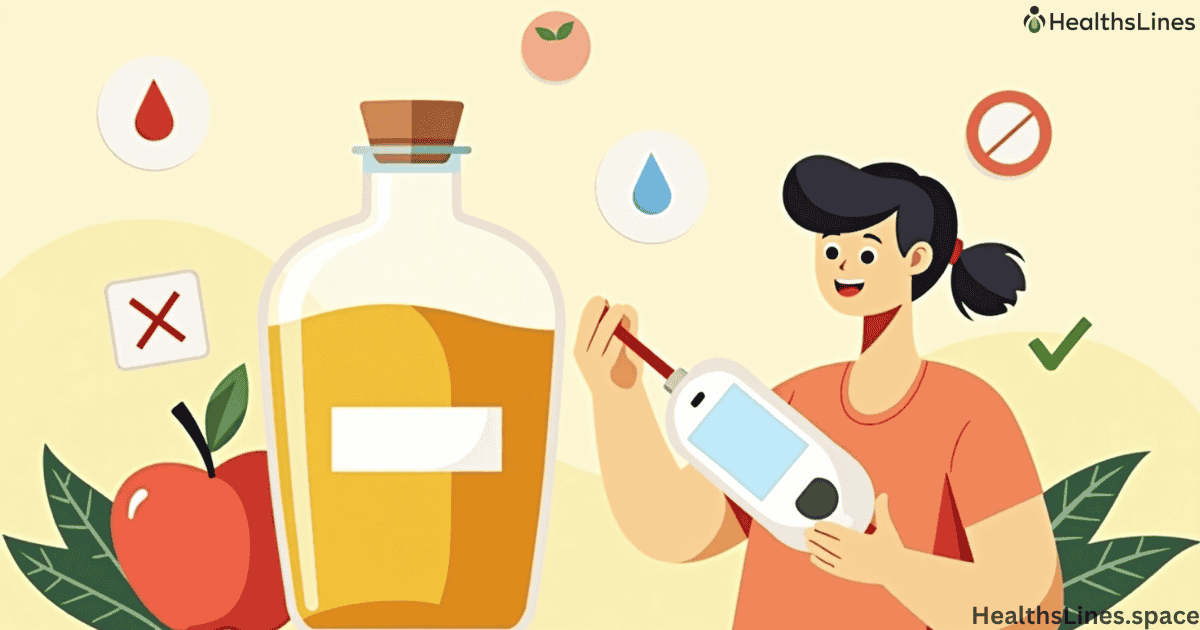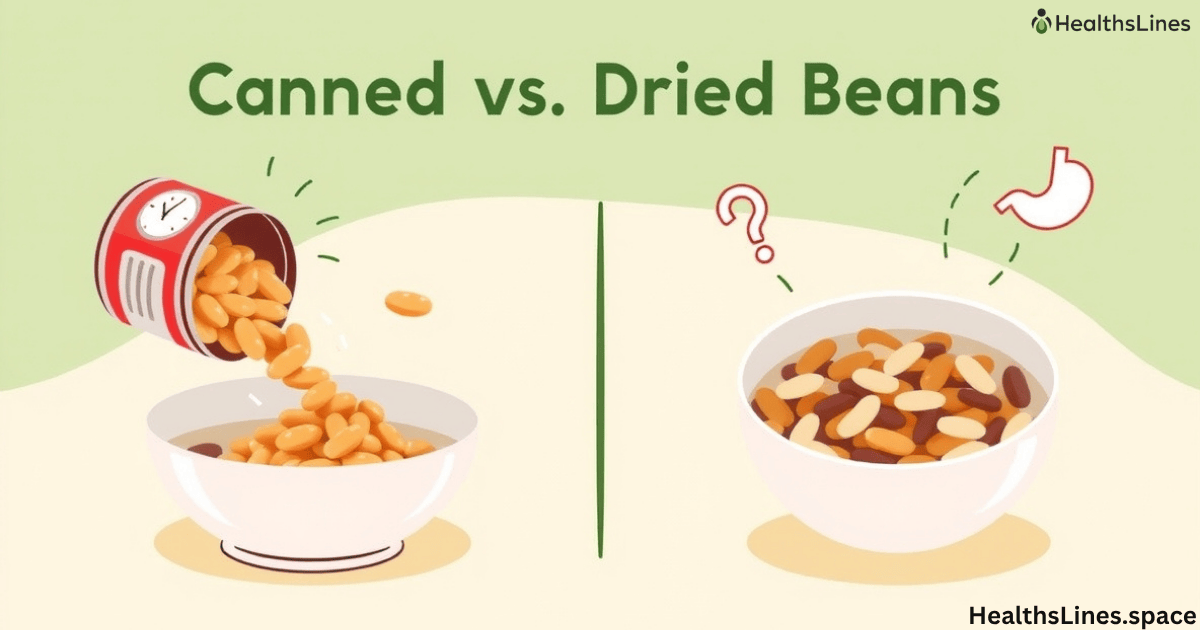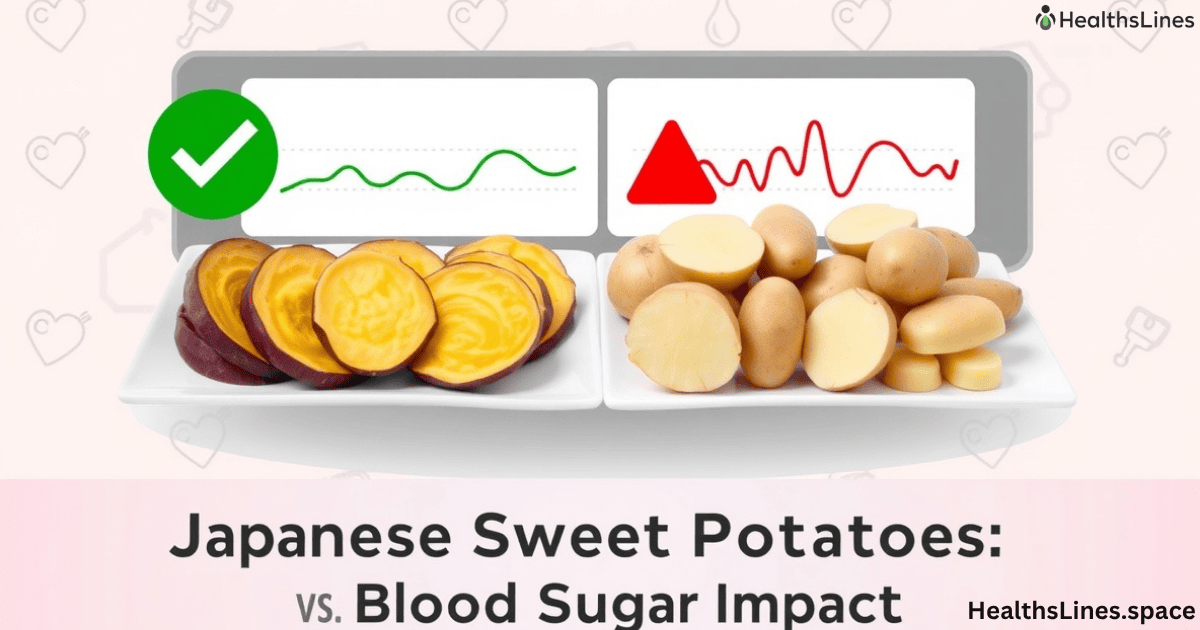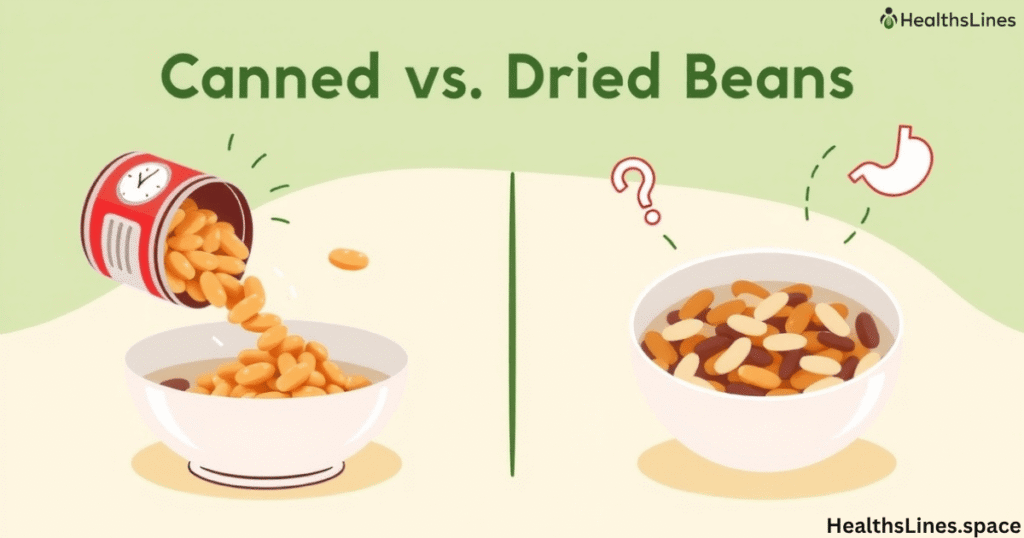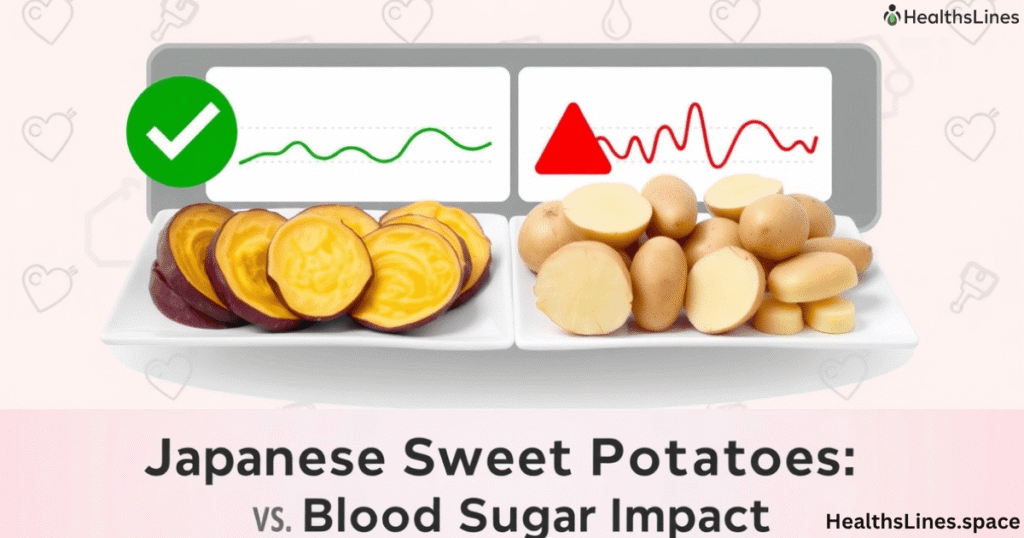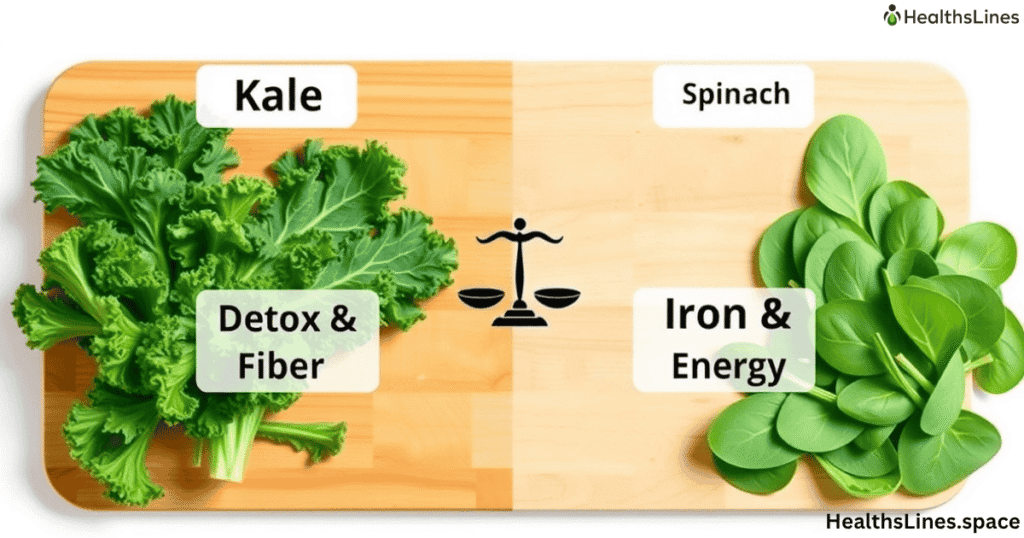Apple cider vinegar and blood sugar are often talked about together. Some people use it to manage sugar levels, especially if they have type 2 diabetes or prediabetes. But how does it work? And is it safe? This post explains how apple cider vinegar (ACV) helps with blood sugar control, how it works in your body, when to take it, and what science says about it. Everything is written in simple words so it’s easy to understand. We’ll also look at side effects and safety tips.
What Happens to Blood Sugar Right After Drinking ACV
When you eat food, especially carbs like bread or pasta, your body breaks it into sugar. This sugar enters your blood and makes blood glucose levels go up. If too much sugar gets in too fast, your body has a hard time handling it. This is called a blood sugar spike.
Drinking apple cider vinegar before eating slows this down. The main part of vinegar is acetic acid. It tells your body to digest food slower. This means less sugar hits your blood at once. So, you feel full longer and your sugar levels don’t jump quickly. One small study showed that people who drank diluted apple cider vinegar before a meal had lower sugar levels afterward. It also helped with insulin sensitivity, which means the body used insulin better. That’s good news for people with diabetes.
Even if you don’t have diabetes, this can help stop sugar crashes that make you feel tired or shaky. It can also help keep your energy more even during the day.
Long-Term Use: Lower Morning Sugar and Better Insulin Use
Taking apple cider vinegar for diabetes over a long time may also help with morning sugar levels, also called fasting blood sugar. This is the sugar in your blood when you wake up and haven’t eaten yet. High fasting sugar is a big problem in type 2 diabetes. Studies show that people who used raw apple cider vinegar for weeks had lower fasting sugar. Some also had lower HbA1c, which shows how high your sugar has been over the last 2 or 3 months.
A famous apple cider vinegar diabetes study found that people who took ACV every day had better sugar control over time. They also needed less insulin to handle the same amount of sugar. This means their bodies became more sensitive to insulin. That’s very helpful for people with insulin resistance.
Doctors think this happens because acetic acid tells your liver to stop making so much sugar. At night, the liver often releases sugar into the blood. This can make fasting sugar high. But ACV helps stop that. So when you wake up, your sugar may be lower. Over time, this may lower your risk of health problems like nerve pain, kidney issues, or heart trouble.
How Acetic Acid Helps Your Body Use Sugar
Acetic acid and blood sugar are closely linked. Acetic acid is what gives vinegar its sour taste and strong smell. But inside your body, it does something powerful. It tells your liver to slow down sugar production. This process is called gluconeogenesis. If you make too much sugar when you’re not eating, your fasting sugar stays high. ACV helps keep this in balance.
It also turns on something called AMPK. This is an enzyme, or helper, that tells your body to burn sugar and fat for energy. This helps lower the sugar in your blood. It’s like flipping a switch to help your cells use fuel better.
ACV also makes your stomach empty slower. That means food moves more slowly into your intestines. Sugar goes into your blood more slowly. This leads to smaller changes in your sugar levels after meals. So, if you take apple cider vinegar with carbs, your sugar levels stay more stable.
All of this makes vinegar helpful for people trying to manage diabetes or prevent sugar spikes. It helps your body handle sugar in a more natural way.
When and How to Take Apple Cider Vinegar
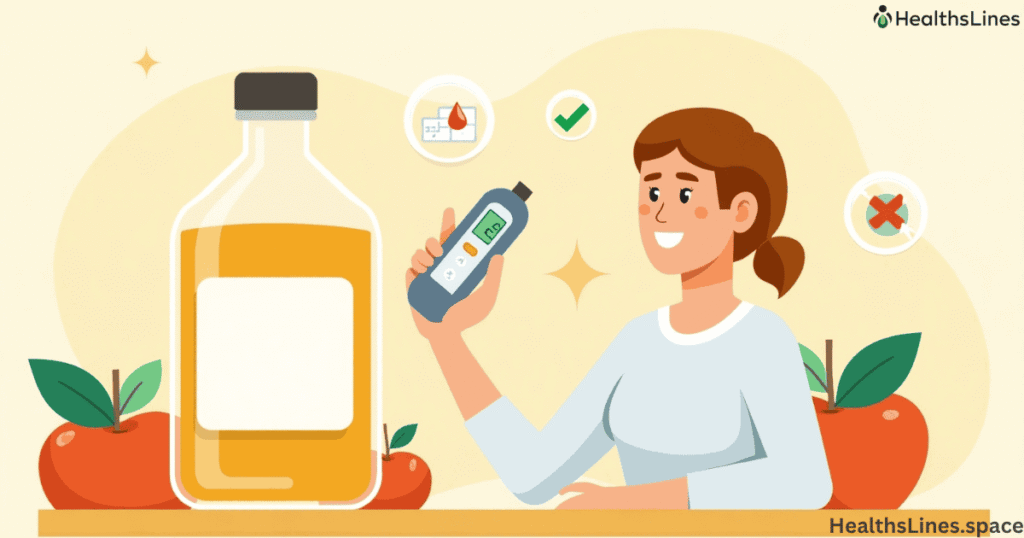
The best time to take ACV is just before you eat, especially before meals with carbs. This gives your body time to prepare. The sugar from food will enter your blood more slowly. Many people take 1 or 2 tablespoons of diluted apple cider vinegar in a full glass of water before lunch or dinner. Never drink it straight—it’s too strong and can burn your throat or hurt your teeth.
Some people don’t like the taste of vinegar. If that’s you, there are other options. You can try:
- Apple cider vinegar capsules
- Apple cider vinegar gummies
- ACV pills vs liquid (some people say liquid works better, but pills are easier to take)
These are all fine, but make sure they have acetic acid and check the labels. Some products have sugar added, which can cancel out the benefits.
This table helps compare different forms of ACV:
| Form | Taste | Convenience | Best For |
| Liquid ACV | Sour and strong | Less convenient | At-home use |
| ACV with the Mother | Strong, cloudy | Less convenient | Traditional use |
| Apple Cider Vinegar Gummies | Sweet and easy | Very convenient | Kids or taste-sensitive |
| Apple Cider Vinegar Capsules | No taste | Very convenient | Travel or daily routine |
Who Should Be Careful with Apple Cider Vinegar
Even though ACV is natural, it’s not for everyone. Some people should avoid it or talk to a doctor first. If you have:
- Stomach ulcers or reflux
- Kidney issues and ACV concerns
- Low potassium
- Are using diabetes medications
Then you need to be careful. ACV can cause stomach irritation or make reflux worse. It can also lower potassium levels if you use too much. And if you take medicine that lowers blood sugar, apple cider vinegar with insulin can make sugar drop too low. This is called hypoglycemia, and it can be dangerous.
Too much vinegar can also wear down your teeth. That’s why you should always dilute it and rinse your mouth after drinking it. Don’t brush your teeth right after—wait at least 30 minutes.
If you’re pregnant, breastfeeding, or on medications, ask your doctor first. It’s always better to be safe.
Apple Cider Vinegar Is Not a Medicine
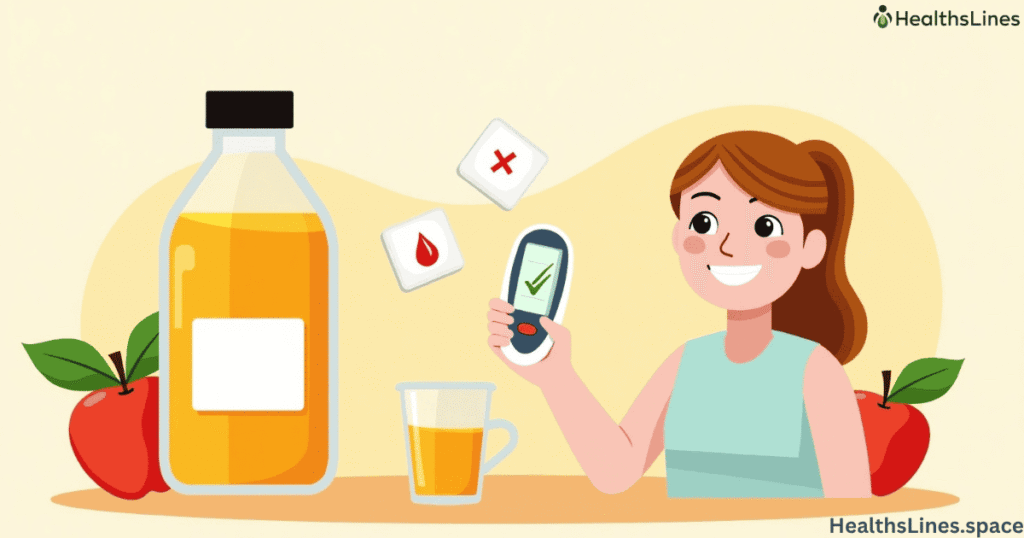
Some people think ACV can cure diabetes. That is not true. It may help manage blood sugar naturally, but it doesn’t fix the cause of diabetes. It should never replace insulin or other diabetes medications.
Think of it as a helper. It supports your body’s work, but it doesn’t do all the work for you. Keep eating healthy, exercising, and going to your checkups. If you use ACV the right way, it might help you see better numbers. But don’t stop taking your medicine without talking to your doctor.
Real Studies and Cases That Show It Works
Many scientists have studied vinegar and sugar. One study from Diabetes Care gave people with type 2 diabetes 2 tablespoons of ACV before bedtime. In the morning, their sugar was lower than the group that didn’t take any. Another ACV clinical trial showed that vinegar before a meal lowered post-meal blood sugar by 20%.
A small apple cider vinegar case study told the story of a woman with prediabetes. She drank ACV with the mother every day before lunch and dinner. After 10 weeks, her HbA1c levels dropped from 6.2% to 5.8%. That’s a big improvement. She didn’t change her medicine. She just added vinegar and stuck with it.
One more study on vinegar and metabolism showed that people had better sugar control after just three days of use. Even people without diabetes had less hunger and more stable energy.
Final Thoughts
If you want to support your body and manage sugar better, apple cider vinegar and blood sugar may be a good match. It can help lower fasting glucose, reduce post-meal sugar spikes, and improve insulin sensitivity. But it works best when used with other good habits like exercise and eating fewer carbs.
Start small. Use liquid ACV with water once a day and see how your body feels. If it upsets your stomach, try apple cider vinegar gummies or capsules. Just make sure it has real acetic acid. Don’t expect magic, and don’t stop your medicine without asking your doctor.
In short, does apple cider vinegar lower blood sugar? Yes, it can—but only if you use it the right way and stick with it. Apple cider vinegar for type 2 diabetes works best when you treat it as a tool, not a cure.
